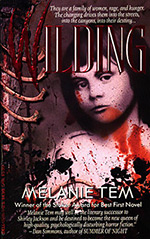
![]() charlesdee
charlesdee
5/17/2018
![]()
Four sisters each build a house on a single city block in Denver during the final years of the 19th century. Each house stands alone on its side of the the block, and a brick wall makes a compound of the overall structure. The houses are the grandest homes the sisters have ever had. Before Denver they lived at various times in the woods of Pennsylvania, an island off the coast of the the Carolinas, and in the Florida Everglades. Their family originated in caves and dugouts high in the Carpathian mountains.
The four sisters are the "citified" branch of a clan of werewolves, most of whom have taken up residence in the mountains and canyons outside of Denver. The mountain dwellers look down on their relatives' decision to move into a city. They think they are putting on airs, But it is to these four houses that they gather for important events, such as when a girl child comes of age. The novel opens with Deborah, the child of Lydia and great-grand daughter of Mary, the clan's ruling matriarch, ready to celebrate her fifteenth birthday. Deborah is also pregnant, having allowed herself to be gang banged at a drunken teenage party. But something goes wrong. Mary declares that Deborah is not ready to transform. Deborah goes on the run, disappearing into the street life of late 20th century Denver. Much else starts to go wrong, as well.
As Tolstoy said, "All happy families are alike; every unhappy family is unhappy in its own way." Wilding is about a very unhappy family. Lydia, Deborah's mother, has never successfully transformed and lives her life as a drudge to her older female relatives, cooking them meals they don't enjoy and cleaning human and animal remains from the four now largely abandoned houses, as well as the vomit and excrement her great-grandmother leaves indiscriminately wherever she sleeps or prowls. Lydia's mother and aunt are considering a takeover scheme, but the mountain clan has plans of its own. Pregnant Deborah is living under a bridge with homeless people. Lydia must decide if responding to the lesbian overtures of her coworker at the bookstore where she is employed is worth the inherent risks.
Where are the menfolk? We learn about the men in Lydia's memory of Deborah's birth.
At first Lydia was crazy with relief. They won't take her. They'll have no use for her blood to drink, or for her new flesh, or for tallow and unguent from the melting of her body.
Male children are sacrificed at birth and their fathers are usually consumed after they ejaculate. Werewolves, it seems, are a fertile bunch, although only the mountain dwellers still give birth to litters rather than single children.
Tem does savagery well. She makes no pretense that there is anything noble about these creatures. They are dangerous wild animals, existing in a state of fear infused anger. They flinch at every human touch, fearful of its seductive appeal. It is against their nature. This is Mary when she catches of glimpse of her great granddaughter running on all fours .
...Mary's heart leap[ed]
Anger. Wildness. Anger in the streets. Anger in the veins. Anger slicking the outsides of buildings, turning coppery the panels of reflective glass, streaking brown and red the concrete and steel. Anger pooling in the bedrooms, kitchens, hallways, stairways, cellars, attics, closets where people loved and where they died...Mary knew: Never enough anger. Never enough blood. Even though the world reeked of it...
Later we get this edifying moment with Deborah's grandmother. "It had been a long time since Ruth had tasted the sweet hallucinogenic tissue of a baby's heart..."
But Tem is not writing a gross-out horror novel. There is no shortage of outrageous images and episodes -- Dachshund lovers should not read this book -- but Wilding is at heart of family saga. It is as bloodthirsty and unrelenting as its characters and completely engrossing.